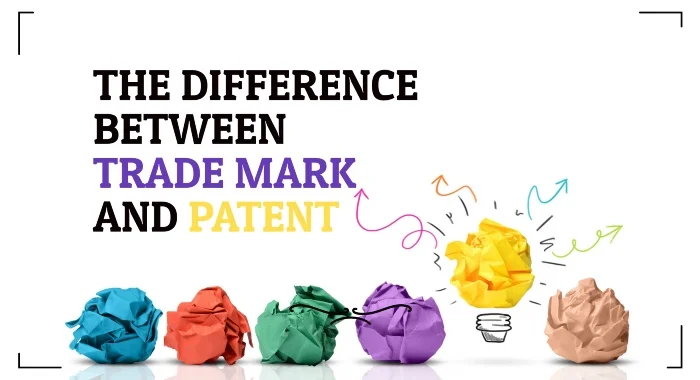When you’ve had a great idea for your business or product, the last thing you want is someone to steal it from you – or beat you to its release. This is where trade marks and patents come into play.
Although they cover different areas (which we’ll get into below) patents and trade marks share a common goal: to protect your ideas and ensure that no one else uses it without express permission.
That means that while they’re active, another company cannot come in to make money off your ideas.
In theory, trade marks and patents are brilliant assets for your business. But there are a lot of exceptions to what can and cannot be protected, so they might not always be the best use of your time and resources.
In this guide, we’ll go through the difference between trade mark and patent in the UK and exactly what you can protect with each.
What are trade marks?
First, let’s start with trade marks, which give you legal ownership of an element of your business, such as your name or logo. Trade marks can be quite varied, covering all manner of elements such as:
- A shape (such as the Coca-Cola bottle)
- A colour, or shape (or combination of, like Lidl’s yellow circle on a blue background);
- A position (like where the Nike tick is on their trainers)
- A pattern
- A sound (such as the ‘Ba dad da da, I’m Lovin’ It’ McDonalds Jingle)
- A motion (Such as Microsoft’s Windows logo)
- Any kind of multimedia item
- A hologram
- And more
With trade marks, you can have pretty much free reign over this as long as it’s unique and cannot be confused for another, already registered trademark, or isn’t a descriptive name.
So, for example, you couldn’t trade mark ‘Tresco’, as that’s too similar to ‘Tesco’. Similarly, you couldn’t trade mark ‘Discount grocery store’, as that would be too descriptive.
In addition, trade marks cannot:
- Be offensive, i.e. contain swear words or sexual images
- Be misleading, i.e. use words like ‘organic’ or ‘local’
- Be too common and non-distinctive, like “the best in town”
- Use of official emblems, hallmarks or national flags
There are some exceptions here, for example, you could have permission to use a national flag by a government body. But these cases are pretty rare, so we’d avoid this list if you want to get your patent approved.
What are patents?
Like trade marks, patents allow you to legally own an idea. However, patents only apply to the ownership of inventions, provided that they meet the following requirements:
- The invention is new and hasn’t been made public before you filed for your patent.
- The invention has an ‘inventive step’ that is not obvious to someone with good knowledge and experience of your subject, i.e., it can’t be created by anyone.
- The invention has to be made or used in some kind of industry (if it’s something you plan to sell, or use for your business, then this point is cleared).
Generally speaking, patents are applied to physical inventions – not discoveries, ideas and theories. Other restrictions include:
- Mathematical methods
- Plant variety
- Any literary, dramatic or artistic work
- A method for performing a mental act, playing a game or doing business
- The presentation of information or a computer program
- A treatment method for humans or animals, whether by surgery, therapy or diagnosis
- Software that has a ‘non-technical’ purpose
However, there is an exemption for inventions like new industrial processes or methods of industrial operation, which will hit the last requirement point.
Starting A UK Business?
Get rid of the confusion and always know what to do next with Startup Hive, the step-by-step platform created by the Business4Beginners team.
- FREE Step-By-Step Platform
- FREE Bank Account
- FREE Bookkeeping Software
- FREE Email Platform
- FREE Domain Name
- Discounted Company Formation
- Plus Much, Much More!

Join today for 100% FREE access to the entire Plan & Establish phases, taking you from validating your business idea through to setting it up, getting your accounts sorted, and creating a website.
“Excellent guide to build your business”
“The perfect starting point”
“Incredibly simple and intuitive to use”
Startup Hive is your trusted companion as you look to turn all of your business dreams into reality. Join today for free.
—
The difference between trade mark and patent
The most considerable difference between trade mark and patent is the type of asset they protect. Trade marks protect names, or elements of a brand or business like logos, phrases or designs. In contrast, patents are for the protection of inventions only.
The second biggest difference is how long they last.

Trade marks last for 10 years when registered, but can be renewed an unlimited number of times after this date. Every time you want to renew, you must pay a fixed amount of £200 per class of goods or services your trademark is in, plus an extra £50 per additional class.
However, if you’re not actively using your trademark, then someone else can apply to get it removed from the register.
So, for example, if you registered a business name, and then stopped trading under that name, someone could file to get that particular name removed from the register and make it free to use again.
Patents, on the other hand, last for 5 years once registered. Once this initial period is up, you can renew it every year for up to 20 years.
The renewal fees for patents vary, going up in incremental amounts depending on what year you are renewing your patent in. For example, the first renewal will cost you £70. Your 10th year would be £170. And the final 20th year would be a whopping £610 to renew.
A late fee of £24 also applies if you don’t renew your patent on time. If 6 months have gone by without renewing your patent, you will be given a 13-month window where it’s possible to ‘restore’ it, provided you give a good reason why you missed the deadline.
After this period, your patent will no longer stand.
| Trade mark | Patent |
| Lasts for 10 years | Lasts for 5 years |
| Unlimited renewals available | Renewed every year, for a maximum of 20 years |
| Fixed renewal cost of £200 for the first class of goods, and £50 for each additional class | Renewal fees rise each time you renew it |
Trade marks vs patents
As you can see, it’s important to know the difference between trade mark and patent before you can decide which one is the right one for your idea.
While trade marks and patents are both areas of intellectual property, they cover slightly different things for your business. Generally speaking:
- Trade marks cover elements of your brand identity, such as sounds, shapes, colours, words or more
- Patents cover physical products or inventions
If you want to find out more about trade marks and patents – including how to apply for one, read our FAQ guide here.






